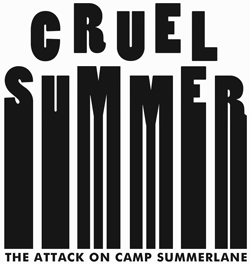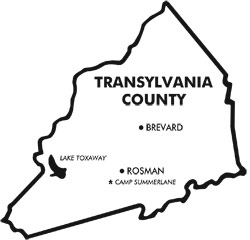
Part 1: Burning memories (Part 1)
Jon Elliston | 06/18
Tomm Friend was snoozing in his cabin when gunfire and the whoosh of flames pierced the night quiet. “I was awakened by a blast,” Friend remembers 45 years later. That summer, the 15-year-old was attending a camp on the outskirts of Rosman, N.C., a small mountain town about a dozen miles southwest of Brevard.
Dressing quickly, Friend bolted into the dark. “I ran down in the direction of the blast, and a woman dropped out of a tree with a machete, right in front of me,” he recalls. Recognizing her as a camp counselor, a relieved Friend blurted out that they knew each other—that he was with the camp, not the mob that was assaulting it.
“She was basically hiding in a tree, protecting children. She had a machete because she didn’t have a gun,” Friend explains; the camp’s few firearms were in other hands. “Then she told me to be careful and climbed back into the tree.”
The camper pressed on, as shouts and gunshots split the hum and gurgle of crickets and streams. Down a hill, in the cove near the camp’s entrance, Friend came upon a surreal scene: A small lake was on fire, the flames wafting across the water.
The attack on Camp Summerlane was under way.
Read part one …

Part 2: Storm clouds (Part 2)
Jon Elliston | 06/25
In April 1963, seven Camp Summerlane staff members journeyed to Western North Carolina from assorted points around the country. “The dogwoods were just starting to bloom,” one of them remembers, and at first, springtime in the mountains seemed to offer a welcoming setting for the new camp.
Granted, there was much work to be done to prepare the facility—an inactive summer camp about 15 miles southwest of Brevard, near the tiny town of Rosman. Fifty-some children, along with 10 or so additional adult staffers, would be arriving in July.
And while they would need the usual amenities for a summer of hiking, swimming, roasting marshmallows and such, Summerlane was also preparing to implement an unusual social experiment: At this camp, children and adults would be given an equal say in determining most camp rules and activities. There was also a social-service component, as some of the older campers would be doing outreach work with migrant laborers. And even as civil-rights battles flared around the South that summer, children of all races were invited to attend.
Part 3: Showdown (Part 3)
Jon Elliston | 07/02
Robin Ludwig’s first experiences in the South were something close to magical. The 14-year-old New Yorker started summer vacation at the brand-new Camp Summerlane in the first week of July 1963.
To get there, he’d hopped on a bus that joined a caravan of campers from up north who were headed for Western North Carolina. The first day of the trip, “We drove and drove, and somewhere in Virginia, we pulled over to the side of the road in this incredible grove of giant pine trees,” Ludwig recalls. “There were fireflies everywhere, and we just spread out our sleeping bags and camped out. When we woke up in the morning, we found out we were in the middle of a boysenberry thicket, so we got to eat boysenberries for breakfast. We were all little teenagers from heavy, urban places … and suddenly, we were turned into nature.”
That sense of wonder continued as the caravan reached Camp Summerlane, a 165-acre retreat a few miles outside Rosman, a mountain town southwest of Brevard. “It was someplace else,” he says. “We figured we were in the middle of a bluegrass song.” Along with the rest of the 50-some campers, Ludwig planned to stay for the remainder of the summer.
Read part three …
Part 4: Smoked out (Part 4)
Jon Elliston | 07/09
Dave Alexander, a 23-year-old cub reporter for the Asheville Times, went to work early the morning of July 12, 1963. His editors greeted him at 6:30 a.m. with an urgent tip: Something big was going down around Rosman, a town near Brevard.
The remote, sparsely populated place didn’t typically make much news, but this day would prove an exception. The state Highway Patrol had called to alert the paper that a chaotic clash was going on at the newly opened Camp Summerlane, a few miles outside Rosman. “So I jumped into my little Volkswagen, and away I went,” Alexander remembers.
Summerlane was a little more than an hour’s drive from Asheville. About 8 a.m., the reporter reached the outskirts of the camp, where he found law-enforcement officers standing watch around the perimeter. Parking his car, he walked toward them and started to ask, “What’s going on?”
Read part four …
View key documents and other materials as the story unfolds.





Before you comment
The comments section is here to provide a platform for civil dialogue on the issues we face together as a local community. Xpress is committed to offering this platform for all voices, but when the tone of the discussion gets nasty or strays off topic, we believe many people choose not to participate. Xpress editors are determined to moderate comments to ensure a constructive interchange is maintained. All comments judged not to be in keeping with the spirit of civil discourse will be removed and repeat violators will be banned. See here for our terms of service. Thank you for being part of this effort to promote respectful discussion.